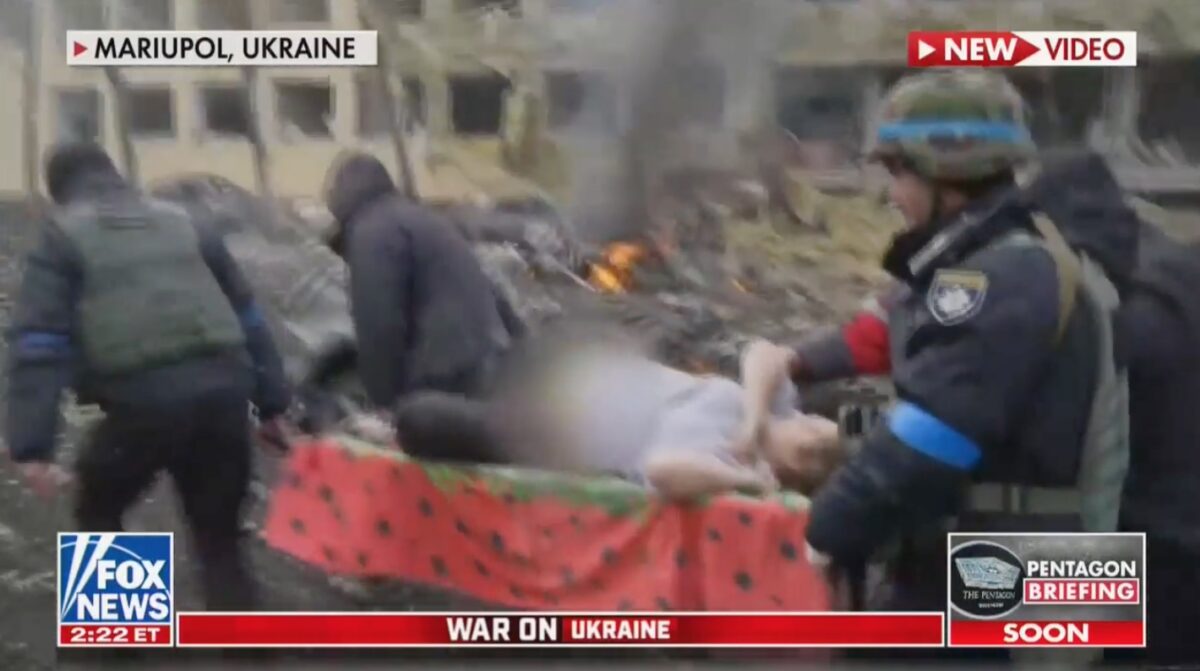AP Journalist Reports Terrifying Account of Leaving Mariupol After Covering Russia’s Maternity Hospital Attack

A video journalist for The Associated Press released a harrowing recollection of what he saw and experienced while covering Russia’s devastation of Mariupol in the middle of their invasion of Ukraine.
Mstyslav Chernov published his account on Monday, and he began by explaining how he and his team were sheltering at a hospital as they documented Russia’s attack on the city. Chernov said he and his group were “the only international journalists left” in the city after 2 weeks of reporting, but on March 15, Ukrainian soldiers arrived at the hospital, asked to see them, and said, “We’re here to get you out.”
Chernov said he and his colleagues were on a “list of names” the Russians were hunting, and here’s how described what happened next:
Nine minutes, maybe 10, an eternity through roads and bombed-out apartment buildings. As shells crashed nearby, we dropped to the ground. Time was measured from one shell to the next, our bodies tense and breath held. Shockwave after shockwave jolted my chest, and my hands went cold.
We reached an entryway, and armored cars whisked us to a darkened basement. Only then did we learn from a policeman we knew why the Ukrainians had risked the lives of soldiers to extract us from the hospital.
“If they catch you, they will get you on camera and they will make you say that everything you filmed is a lie,” he said. “All your efforts and everything you have done in Mariupol will be in vain.”
Chernov recalled how he prepared to cover Mariupol just before the war began, and how the city was impacted by Russia’s attack on cell phone towers and communications facilities.
“With no information coming out of a city, no pictures of demolished buildings and dying children, the Russian forces could do whatever they wanted. If not for us, there would be nothing,” Chernov said. “That’s why we took such risks to be able to send the world what we saw, and that’s what made Russia angry enough to hunt us down. I have never, ever felt that breaking the silence was so important.”
Chernov said that as his team stayed around the hospital, “the doctors pleaded with us to film families bringing in their own dead and wounded, and let us use their dwindling generator power for our cameras. No one knows what’s going on in our city, they said.” He described how the area repeatedly got hit by Russian shelling, and the danger they encountered while trying to find parts of the city where they could get a stable enough connection to upload their reporting to the Internet.
For several days, the only link we had to the outside world was through a satellite phone. And the only spot where that phone worked was out in the open, right next to a shell crater. I would sit down, make myself small and try to catch the connection.
Everybody was asking, please tell us when the war will be over. I had no answer.
Every single day, there would be a rumor that the Ukrainian army was going to come to break through the siege. But no one came.
Eventually, Chernov described the day when he and his colleagues documented the evacuation of the maternity hospital where multiple people — including pregnant women and children — were killed and injured after the Russians attacked it. All the while, he was unaware of how the Russian government was trying to discredit his team’s work with their propaganda campaign.
Our batteries were almost out of juice, and we had no connection to send the images. Curfew was minutes away. A police officer overheard us talking about how to get news of the hospital bombing out. “This will change the course of the war,” he said. He took us to a power source and an internet connection. We had recorded so many dead people and dead children, an endless line. I didn’t understand why he thought still more deaths could change anything…In the meantime, in Mariupol, we were inundated with people asking us for the latest news from the war. So many people came to me and said, please film me so my family outside the city will know I’m alive. By this time, no Ukrainian radio or TV signal was working in Mariupol. The only radio you could catch broadcast twisted Russian lies — that Ukrainians were holding Mariupol hostage, shooting at buildings, developing chemical weapons. The propaganda was so strong that some people we talked to believed it despite the evidence of their own eyes.
As Chernov explained how he learned that his team’s coverage drew the attention of the Russian government, he described how his team and a family of Ukrainians were evacuated, led through several Russia-controlled checkpoints, and eventually got out of the city.
We were the last journalists in Mariupol. Now there are none.
We are still flooded by messages from people wanting to learn the fate of loved ones we photographed and filmed. They write to us desperately and intimately, as though we are not strangers, as though we can help them.
Read the full account here.




